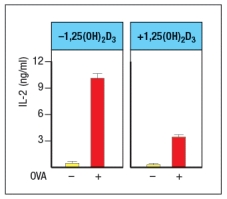Multiple Choice
The vitamin D3 metabolite 1,25(OH) 2D3 binds to the vitamin D receptor (VDR) . This complex then functions as a transcriptional regulator. The activation of VDR following treatment of cells with 1,25(OH) 2D3 has been found to modulate the activity of antigen-presenting dendritic cells. In one study, dendritic cells were isolated from wild-type mice and activated in vitro by stimulation with LPS plus IFN- in the presence or absence of 1,25(OH) 2D3 for 24 hours. These activated dendritic cells were then pulsed with a peptide from the chicken ovalbumin protein (OVA) that binds to MHC class II and is recognized by OT-II CD4 T cells. The peptide-pulsed dendritic cells and T cells were incubated together for 3 days, and then IL-2 levels in the supernatants were measured, as shown in Figure . 
Based on these data, dendritic cells activated in the presence of 1,25(OH) 2D3 are likely to show:
A) Reduced MHC class II and reduced B7 expression compared to controls
B) Enhanced expression of IL-12 compared to controls
C) Reduced expression of IL-6 and TNF- compared to controls
D) Increased expression of MHC class I and class II expression compared to controls
E) Reduced expression of proteins involved in antigen presentation compared to controls
Correct Answer:

Verified
Correct Answer:
Verified
Q20: One clinical trial performed in the early
Q21: In the first few days following organ
Q22: Early efforts to develop a
Q23: Conjugate vaccines, such as those developed against
Q24: Autoimmune diseases are characterized by an
Q26: Safety concerns in the latter part of
Q27: As of 2014, a total of 452
Q28: A recent strategy showing some promise for
Q29: The US Department of Health and Human
Q30: One successful cancer vaccine targets human papilloma